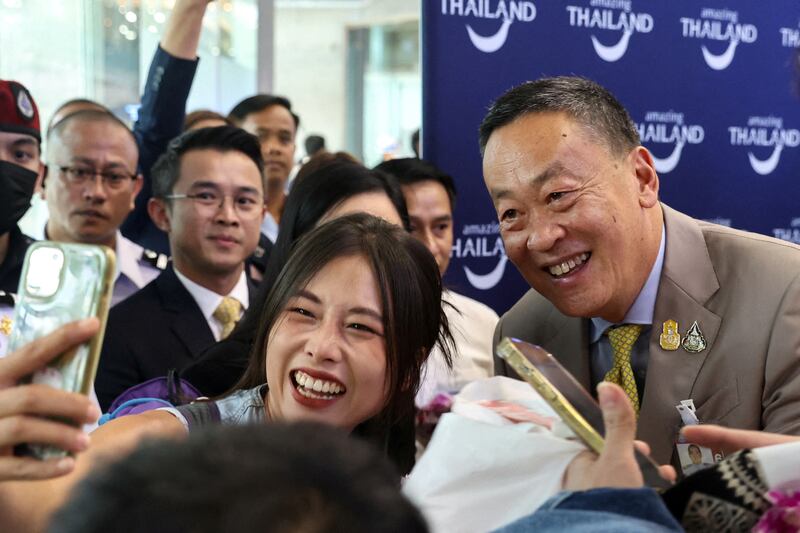China and Thailand need to speed up the construction of a delayed, high-speed railway to link their countries, Chinese Foreign Minister Wang Yi told Thai Prime Minister Srettha Thavisin on Monday at the end of a three-day visit to Bangkok.
The Thai PM, for his part, said Beijing’s loan of pandas to Thailand signified the warm ties between the two nations and he hoped China would soon send a giant member of that rare bear species to replace Lin Hui who died last April.
Wang said he appreciated Srettha’s decision to make China the first country to visit, outside Southeast Asia, after taking office, according to a Chinese foreign ministry statement.
“The two sides should jointly advance high-quality Belt and Road cooperation, speed up the construction of the China-Thailand Railway, and open the central line of the Trans-Asian Railway,” Wang said to Srettha at their meeting, the statement said.
The nations should also “realize regional connectivity, and promote the early implementation of the vision of interconnected development of China, Laos and Thailand, so as to provide new impetus and open up new space for the long-term development of the two countries,” China’s top diplomat said.
Wang didn’t say when he hoped the China-Thailand rail line would be completed, but according to news reports from last year, Thailand was looking at a 2028 completion date.
Srettha said he and Wang discussed extending the high-speed rail project from Nong Khai province through Laos into China.
“This project faces challenges regarding the transshipment of goods. It was agreed that working groups from both countries will collaborate further on resolving these issues,” he said.
The more than U.S. $5 billion high-speed rail project is part of China's Belt & Road Initiative, Beijing's ambitious plan to build a network of global infrastructure and supply chains that would connect China to the rest of the world. The rail line will link Bangkok and the southwestern Chinese city of Kunming, via Thailand's Nong Khai and Laos.
Srettha had said in October that Thailand planned to speed up the construction, delayed due to the pandemic and other reasons, of the rail line to China.
“Logistics is one of the significant issues for Thailand regarding BRI cooperation and Thailand will enhance the connection between its domestic railways and the China-Laos Railway, a flagship BRI project in the region,” Srettha said back then in an interview with Chinese state news agency Xinhua.

Meanwhile, after their meeting, Srettha told reporters that Wang supported his request to send pandas to Thailand to replace the ones that were no more.
“We had pandas in Thailand for many years, and they were very popular with the Thai people,” Srettha said.
“I am pleased that we will be able to bring them back.”
Lin Hui, a giant panda that had been on loan from China to Thailand, died last April after delighting Thais for 20 years. Lin Hui’s male companion Chuang Chuang had died in 2019.
On Sunday, Wang and his Thai counterpart Panpree Phathithanukorn signed a mutual visa waiver agreement to spur tourism between the two countries.
The visa-free agreement will be effective starting PHOMarch 1 and has no end date yet. The agreement allows citizens of both nations to travel to each other’s countries without a visa for up to 30 days.
“We consider this agreement to be a symbol of the long-standing friendship and trust between Thailand and China,” Panpree said. “I am confident that after this, travel between the two countries will be more convenient and help to stimulate the tourism industry of both sides.”
Thailand had previously implemented a visa-free policy for China that began Sept. 25, 2023 and will end Feb. 29, 2024.
In 2023, Thailand received 28 million foreign tourists, far lower than the 40 million tourists it received in 2019, before the Covid-19 pandemic, according to the Economics Tourism and Sports Division.
International tourism made up an estimated 11.5% of Thailand’s GDP in 2019, according to sata from S&P Global.
“Tourism is crucial to Thailand’s economy, and we are confident that the future will see an increase in Chinese tourists, benefiting both nations,” said Srettha.
However, some Thai businesses expressed concerns about the potential return of “zero-dollar” tours, which are often exploitative and can damage Thailand’s reputation.
Wallop Phengnarin, owner of a large restaurant with many branches, told BenarNews that he welcomes the visa-free agreement, but is concerned about ‘zero-dollar’ tours.
Zero-dollar tourism refers to tour companies from China taking visitors only to Chinese-run restaurants, spas or stores, cutting potential revenues to local businesses.
“Before the pandemic, we used to see Chinese tour groups all the time,” Wallop said.
“But the big tours don’t spend much money in Thailand. They already have their own networks in place to arrange accommodation and meals at places owned by Chinese people.”
Wallop said that he prefers backpackers and young Chinese tourists, who tend to spend more money in Thailand.
Paitoon Mekloy, a 45-year-old Bangkok resident, said the visa free policy would definitely attract more Chinese tourists.
“That’s good for the economy, but I hope that Chinese tourists will be mindful of Thai customs. I think the Thai government should do something to explain Chinese tourists about Thai customs,” ,” he told BenarNews
“Maybe they could create some videos or brochures. It would be good if Chinese tourists could learn to be more considerate of others when they travel.”

‘Eager to participate’
The Thai PM also said that Beijing had expressed an interest in investing in Thailand's land bridge mega-project.
The bridge would cut across the Kra Isthmus in southern Thailand and join the Gulf of Thailand to the Andaman Sea, via a rail line and a highway.
“It’s not just the Chinese government but also private Chinese enterprises that are eager to participate,” he told reporters after meeting with Wang.
“Over the past few years, major Chinese companies have been investing in the construction of large industrial plants in Thailand. These investments aren’t just to cater to Thailand’s domestic needs, but also to use Thailand as a hub for export operations.”
The government believes the land bridge will reduce transportation costs and be safer than shipping through the Strait of Malacca.
The project is expected to create at least 280,000 jobs in the region, increase the GDP by 5.5% annually, amounting to approximately U.S. $670 billion when fully developed, according to the government.
Jon Preechawong in Bangkok contributed to this report.
